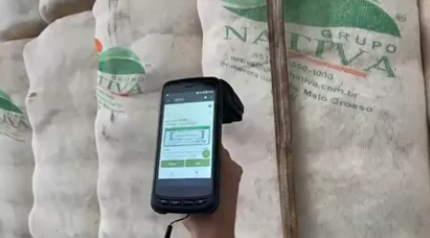Call Us Now
+8615914489090

For many years, ID-Cotton, the Brazilian cotton department, has been committed to the development of RFID technology in this field.
On September 21 this year, a historic achievement of ID-Cotton benefited the entire agribusiness sector in Brazil. ID-Cotton's RFID technology is used to transport the world's first 100% traceable cotton cargo, which is located in the port of Santos, Brazil, and is shipped to Vietnam. At that time, the Vietnamese spinning mill will have all the data on the origin of Brazilian raw materials.
ID-Cotton CEO Flávio Tarasoff set the tone for this achievement: "Now, we are convinced that we have made a real contribution to a milestone in the history of Brazilian cotton—— Using ID-Cotton's RFID technology to deliver the world's first 100% trackable cotton cargo. We are facing many challenges, of course, we have also received the support of many people, companies and institutions in this chain. This batch The goods will be shipped to Vietnam and then tracked to the spinning mill for processing, so as to record all historical information about the origin, including from the cotton planting area to the shipping port."

For four years, ID-Cotton has been developing an RFID solution to track cotton from harvest to processing. Tarasov said that this is a plan for the annual harvest. This set of solutions started with one production unit and has now expanded to more than 45. Brazil’s largest cotton producer Bom Futuro Agro Group took the lead in using ID-Cotton technology, by Scheffer, Amaggi, Locks and Cortezia Agro Groups from Mato Grosso State in western Brazil, which together accounted for 20% above of Brazil’s cotton production.
In the past, all management of ID-Cotton's RFID system in the cotton industry was carried out through manual processes such as labels and barcodes. The deployment of RFID follows the passive EPC UHF standard. Tarasov is convinced that "when companies use all ID-Cotton tools, the benefits they get are the traceability of production, operations management, storage, and the benefits of cotton classification."
ID-Cotton is headquartered in Cuiaba (MT), Brazil, and has the functions of systematic production, operation, support and sales. "In addition, this year we established ID-Cotton AgribusinessLLC in Doral, Florida, USA." The location is strategic because it is close to local ports and airports, and will focus on manufacturing equipment and fully equipped for the international market. The proximity of the area to Texas is also a driving factor, as there is the largest cotton growing area in the United States.
ID-Cotton’s cotton traceability solution is designed to solve the defects in marking and identifying the lap harvesting process, such as the elimination of manual labels, handwritten spreadsheets, “painting on canvas and other identification of producers, farms, varieties, and plantations. , Boundaries, and pollutants.” The ID-Cotton system facilitates the management and processing of the plantation, avoids the pollution of cotton varieties, and ensures the final quality of the product and the price of lint.
In fact, after the cotton is harvested, the RFID tag inserted into the cotton roll will be read and identified by a tablet computer with an ID-Cotton system. This information is synchronized with the company’s ERP. When the company’s ERP transmits the cotton crops, unloads the cotton from the crops into storage and transfers the inventory to the processing area, the system will automatically read it through the RFID reader within one second. Take the output of these cotton rolls.
Tarasov explained: “One of the most important factors is technological change. Because before the cotton is harvested and transported, the barcode labels used have some defects, such as lack of reading data, registration errors, etc., because this process is It's done manually."
The solution developed by ID-Cotton provides integration with ERP. By marking and identifying laps on site, the ID-Cotton system improves productivity and reduces on-site staff.
With the unique identification of the lap, the transportation management of the lap becomes more flexible, and the real-time location of each lap is easier to obtain. Tarasov said, “Our technology reduces the time spent working on the plantation and the use of scales. In the end, the system saves personnel, labels and manual processes, ensuring the true benefits of the final value of cotton.” Based on the system With its modularity and reproducibility, ID-Cotton provides services for the main participants in agribusiness, and can also be used by farmers, cotton units, cooperatives, etc.
"This year, we are importing data recorded on canvas tags for new RFID tags. These data will be added to the lint, which can be used for congestion management, laboratory analysis and tracking, cargo management, loading and unloading, and spinning in the next production chain. The lint classification in the factory."
RFID readings and quality, density, the structure of the vehicle carrying the goods, weather conditions, rainfall, no wind, humidity, the position of the lap on the trailer, the types of trailers with different heights and volumes, the angle of attack of the scale, and other obstacles in the manufacturing process And so on. "Since this is a brand new technology, there are many challenges, most of which are focused on transportation."
ID-Cotton will analyze the tare weight (the weight of the truck without load) and the difference in the structure of the vehicle, etc., to ensure that the readings are accurate. Tarasov said: "Weather conditions, such as rain, sunlight, no wind, and relative humidity will also have an impact, and the system must take these factors into account."